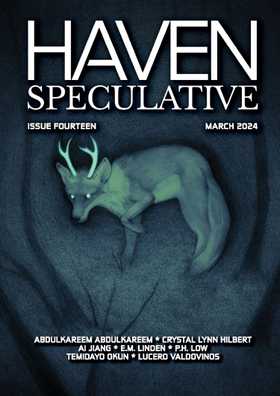FICTION
Radio Petrichor
by E.M. Linden in Issue Fourteen, March 2024
It starts as superstition, like touching wood when she hears the word accident or never slicing into an orange. Then she tests it. Eight Saturdays in a row she drives to Hoban Point, crying her eyes out while the radio pours forth blue.
Years of drought. And then rain, every time.
It isn’t a coincidence. Noemi’s car radio controls the weather.
#
“It’s OK to grieve.” Dr Iso tips her head to signal caring concern. Her earrings clink. She always wears fantastic earrings. Glass beads, swinging hoops, and–Noemi’s favourite–modelling-clay miniatures: lemons, pink-iced cupcakes, glossy donuts with rainbow sprinkles. “It’s cathartic.”
Noemi knows that; she just prefers privacy. Dr Iso thinks grieving only counts if it happens in her office.
#
The first Saturday, Noemi drives out to the Point with the volume up and windows down, her dog Una shoving her nose into her armpit. Her mum’s asleep on the couch. Noemi’s still learning: she’s not supposed to take the car out on her own yet, but she can’t stand the silence in the house. It was never this quiet when her stepfather Sid was alive, playing his beloved records or clattering about the kitchen.
It's still Sid’s car. It’s beat-up, storm-blue, and smells of dog. The retrofitted solar-panels are scarred but functional. When she turns the radio on, it crackles like tinfoil until it catches a song, kind of like how the engine runs smooth once the clutch engages. Sid always put the radio on straight away. Key, solar-ignition, radio, clutch, handbrake. As if the car runs on music as well as solar power. The singer’s voice is equal parts smoke and gin.
This song’s familiar, one Sid used to play. It shakes something loose. With every note the barometric pressure falls. Clouds bank in her left eye; minor-key changes and heartache chords run down the window-panes like raindrops. Cloudburst.
Her own Radio Petrichor.
#
When she pulls into the driveway, Noemi’s mum hauls her out of the car and dances her through the mud. Una leaps around them.
“It’s raining!”
“I know!”
They should grab the big stock-pot, buckets, anything to catch the precious water. Instead, Noemi collapses on the porch next to her mum and laughs. Una plashes muddy pawprints on her knees. The garden trembles with silver.
#
Noemi used to think everyone saw music in colour. Some songs are breezy, sky-blue; some are as pink as Dr Iso’s donut earrings; others have a sunrise glow. Rain-songs are slate-blue, like distant mountains or the sea at dusk.
Her mum was the same. “Play the tangerine song.” She’d wave at the stack of records while Sid washed up. She never remembered the names of tracks or bands. She didn’t have to. “The one with gold flecks.” Sid used to laugh and roll his eyes, but Noemi always knew which song she meant.
#
Now every Saturday Noemi tours the island, music blasting, rainclouds in her wake. Soaking soil, filling tanks, watering crops and gardens.
People starved during the drought. They got sick on bad water. The mainland helped when it could, but it couldn’t do much. Even after the drought ended, rain was scarce for years. Everyone remembers the thirst. Noemi’s mother was afraid, and that had scared Noemi.
Noemi won’t let it happen again.
Rain is a salve; it brings clarity. Noemi’s mum even says it rinses dust off the soul. And it’s true Noemi and the island are both softer after the rain falls. They ache less. People no longer spend every waking minute worrying about surviving. They talk to strangers. They grow flowers. Even the trees breathe easier.
Noemi’s headlights burnish the tarmac. The single windscreen-wiper hush-squeaks against the glass.
#
When she gets home, Noemi’s mum is waiting at the table. She has the teapot and two mugs ready. A bad sign.
“Come here, love.”
Noemi’s heart stalls. Not again. She lets her breath out, steady as her foot on the clutch, like Sid taught her. Everyone’s accounted for. Her mum’s here. Her friends are at Aya’s place; she saw them ten minutes ago. Sid’s dead. Una’s out the back, barking at puddles.
“Una got into Mr Porter’s chickens.”
“Oh God, did she kill any?” Mr Porter relies on those chickens. Her mum can’t afford to replace them. “Was he angry?”
Her mum doesn’t answer, but her eyes are red.
#
Noemi rushes to the car.
“Wait, love–”
The wheels spin and spit dust. Una was her mum’s dog, really; Noemi’s being selfish, making her worry. But she doesn’t slow.
#
She’s never seen clouds like this before: the shape, the colour, the towering height, the speed with which they mass. The music shakes the car. Thunder crashes, splinters, detonates again.
The air is indigo; overripe plums; charged copper wires; the crack of billiard balls. Lightning flares. She always imagined lightning as scribbly lines, but now it sheets across the sky.
Everything goes white. Smoke stings her nose. The radio cuts out. The car slides into a ditch.
#
The car had smelt of Una. Now she doesn’t even have that.
#
“But the radio. Can’t you rescue the radio?”
The mechanic shakes her head.
“You don’t understand,” Noemi says. “I need it. We all do. Even… even fucking Mr Porter needs it.”
Noemi’s mum squeezes her shoulder. Noemi stares past her at the cloudless horizon. Her mouth is already dry.
#
People scan the sky mid-conversation. Make jokes that aren’t jokes.
Nice weather we’re having.
Noemi’s mum is more honest. “If this goes on, people are going to have to make some hard choices.” She draws the curtains over the glaring day.
The island’s more prepared this time. Water reserves are carefully monitored. They’ve saved every spare drop of rain in the last five years. The desalination plant is almost up and running, and every garden and town centre and verge is crowded with drought-resistant plants.
But none of this will help for long. Everyone knows it. Nobody says it.
It’s only a matter of time.
#
“It’s all my fault.”
Noemi hadn’t meant to say that bit out loud.
“What do you mean by that, Noemi?” Dr Iso’s earrings clink. Today, they’re button-sized suns.
She didn’t check the back gate was latched. She drove in the storm. Got Sid’s radio fried. Now, the drought. I messed up, she wants to say. There’s no more rain. But Dr Iso won’t listen. Not to the important part.
Noemi shrugs.
“It’s okay to grieve,” Dr Iso says, like it’s just another Tuesday. Then her face changes. “Oh, I almost forgot! I made you these.”
She tips a pair of earrings into Noemi’s hand. Thumb-printed rainclouds. Slate-blue, dusted with silver glitter.
#
Noemi sits on the front step, staring at the herbs. She can practically smell the garden withering. At least Una’s already gone. She knows what happened to pets during the drought.
Someone clears her throat. She turns. Mr Porter leans on their shared fence.
Noemi gets up to leave. Reminds herself that his chickens are dying in the heat. That he’s given each one a name. Poppy, Daisy, Marigold. She always forgets, when Sid died and Noemi’s mum couldn’t work, that Mr Porter brought them fresh eggs every week.
“Mari was a dog person,” he says.
He’s a widow. She forgets that, too.
“She always said I was too hasty.” His shoulders slump. “Thought it was a fox. Should have checked. I’m sorry.”
“It’s okay,” she says. Dry-eyed, blank faced. She’ll never stop missing Una.
Mr Porter tries to smile and doesn’t quite manage it. Like he knows the feeling. He turns back to his own dry garden.
#
She takes the new-old car, driving for the first time since she totalled Sid’s. They couldn’t find a second-hand one with a radio. It’s not the same. No music. No rain threading down the windows. The silence shaped to fill the loss inside her. She still hasn’t cried for Una yet, but her jaw aches from clenching her teeth.
A skinny animal limps along the road from town, pointing its head hopefully after each of the few cars that drive past. A dog. A blue collar hangs loose around its scrawny neck. For a second she thinks, Una, and her heart jumps painfully. But Una was russet brown. This dog is salt-and-pepper. She watches the dog in the rear-view mirror until she rounds the corner.
It’s a weak thing to do, abandoning a dog because you can’t bear to end or watch its misery. It’ll happen more and more as the drought drags on. Her mother, a farmer’s daughter, always insisted on keeping a gun, though Noemi never once saw her shoot as much as a rabbit. She never used to understand why. Then she did.
She doesn’t blame the dog’s owners. Maybe she’d make the same choice. It’s not like she could do anything else.
Of course she couldn’t give her island a future. She can’t even save a dog.
She stops the car anyway. Just looking, she tells herself. The dog is nowhere to be seen. Dusk falls; the tinder-dry fields shades to graphite blue. The jagged heat of the day softens. She won’t find the dog, now; she tells herself that she’s relieved. Still, she waits.
It’s almost dark when the dog pads into view. Rangy. Outsized-paws as if she’s only half grown. She’s tiring, ribs going in and out, head heavy, pausing often. She still scans the road anxiously. Like there must have been some mistake. Like the car she recognises will be back any minute.
Noemi opens the car door.
“Here, girl!” she calls. “Here!”
The dog lifts her ears. She’s too tired to move fast, but she limps up to Noemi as if she’s known her all her life. There’s relief in every line of her body. Noemi unscrews the precious water bottle that’s meant only for emergencies, and measures her out some water.
Noemi can’t help it; she thinks of Una. Her wet nose and brown eyes and tenting eyebrows; the way she cocked her head to try and understand the noises her people made.
Noemi puts her arms around the dog’s neck and cries. The dog licks her on the cheek. The dog’s tongue is sticky-dry. Her fur smells of road-dust. Noemi cries so hard she gulps and hiccups and her throat hurts and her nose runs. The dog bears it all patiently.
Something cold and wet noses the nape of Noemi’s neck. She lifts her head and touches the spot. A sense-memory of Una. When Noemi sat on the front step, or bent her head to tie her shoelaces, Una always nuzzled the nape of her neck to hurry her up. It’s silly, but it feels like Una’s approval.
That isn’t how Dr Iso would put it. Well done, she’d say, you’re finally letting yourself mourn your dog. And then probably some other guff, some nonsense about her grief for Una being a proxy for her grief for Sid.
Dr Iso didn’t get it. Una was never anything more or less than Una.
Noemi touches the nape of her neck again. She looks up. Another raindrop falls.
#
The rain gains momentum. She lifts the dog onto the passenger seat. She drives with all the windows down, in a cloud of ozone and wet dog smell, rain streaming through the window and soaking her arm, her shorts, the car seats. Rain silvering the world. Rain like music, making the island sing.
Noemi pulls in beside her house and lets the dog out. The dog immediately curls up on the porch, the way Una once did. Rain thrums on the roof, the vegetable patch, the olive tree. It’s raining all over the island. Noemi lifts her face.
It still hurts. The island is a land of dry rivers and dead trees. Nothing heals overnight. But Noemi understands, now. It’s not the radio that brings the rain. It never was.
Creek-stones shimmer. Petrichor fills the air. The land will green; the rain will come again.
© 2024 E.M. Linden
E.M. Linden
E.M. Linden (she/her) is a speculative fiction writer from Aotearoa New Zealand who likes coffee, books, owls, and the sea. Her work has appeared in Strange Horizons, The Deadlands, Flash Fiction Online, the Locus Recommended Reading List (2022), and various other places. She is online at emlinden.blog or @emlinden.bsky.social.





